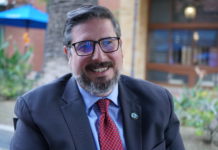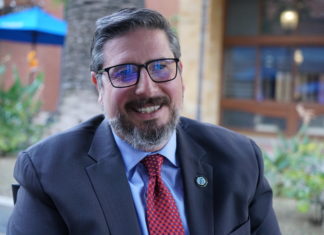MISSION HILLS, Calif. – The COVID-19 outbreak has affected Ararat Home in much the same way that it has all long-term care facilities. Responding to this crisis has required implementing a series of measures to protect residents from possible exposure to coronavirus. These measures have drastically changed the operations of the Home leading to a significant disruption in the everyday lives of residents and a heavier workload for staff.
Ararat Home operates three facilities. The main campus in Mission Hills is home to Ararat Nursing Facility (a 254-bed skilled nursing facility) and Ararat Assisted Living Facility (which currently has 110 residents). The satellite campus in Eagle Rock is home to Ararat Convalescent Hospital (a 42-bed skilled nursing facility). The great majority of residents are of Armenian descent. The majority of employees are of Armenian descent.
As the number of COVID-19 cases grew in Los Angeles County in early March and the first case of community transmission was announced on March 9, Ararat Home’s administration began reviewing the protocols, policies and procedures that had been established for the facilities, while closely monitoring the changing recommendations set by local, state and federal governmental health agencies as well as those from relevant health care associations.
Acting somewhat ahead of those guidelines, the administration restricted visitor access to facilities beginning on March 6. Considering the close-knit nature of Armenian families, some of whom would visit their loved ones at Ararat Home, quite regularly bringing clothes and other necessities and goodies with them, this restriction was understandably difficult to accept initially. However, with regular communication from the administration and management and the growing crisis in Los Angeles County, residents’ families appreciated the gravity of the situation and expressed their support for the restriction.
Following the visitor restriction, the other measures put in place by the administration have progressively been more stringent in an effort to mitigate the risk of exposure and spread of COVID-19 within the resident population as well as among staff. The strict infection control and prevention measures that have been implemented include the ongoing re-training of staff in these practices and educating residents in proper handwashing and coughing/sneezing etiquette. The facilities are constantly being cleaned and disinfected. For several weeks, all staff members have been required to wear a mask during their shifts, and they continue to be monitored throughout their work hours for any symptoms. Similarly, staff is closely monitoring all residents for any symptoms.
In addition to the restriction of outside visitors, all non-essential consultations within the facilities and residents’ appointments or visits outside of the facilities have been canceled. Besides halting the interaction of residents with non-staff outsiders, residents’ interactions with each other were also scaled-down and eventually stopped. All communal spaces (for dining and activities) are now empty, as residents are asked to remain in their rooms. All meals are served to residents directly in their rooms and all social activities have been canceled.








